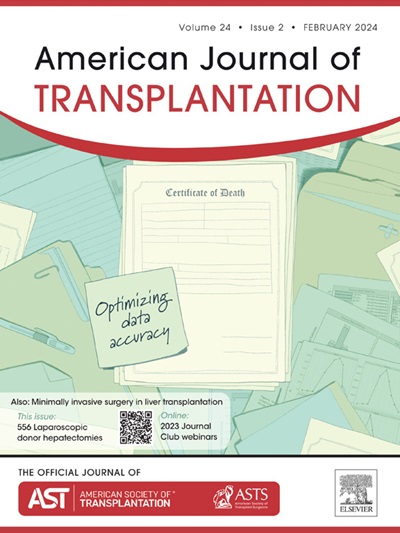罗切斯特未切除大肠癌肝转移活体肝移植协议》:关于选择、批准和结果的五年报告。
IF 8.9
2区 医学
Q1 SURGERY
引用次数: 0
摘要
活体肝移植(LDLT)是不可切除结直肠肝转移(uCRLM)患者的一种治疗选择。我们介绍了本中心在2019年3月首次转诊后在患者选择、保险批准和LDLT术后疗效方面的经验。在 206 名接受评估的患者中,23 人接受了 LDLT。我们发现,在肿瘤病程早期转诊的患者更有可能符合移植条件。在完成罗切斯特 LDLT 资格认证协议后,受者因保险上诉而延误治疗的时间中位数为 10 天(IQR 0-36),其中 6 名患者(30%)的延误时间超过 30 天。LDLT受者1年和3年的总生存率分别为100%和91%;1年和3年的无复发生存率分别为100%和40%。所有捐献者都接受了右肝切除术,其中只有一名捐献者出现了 Clavien-Dindo IIIa 并发症并再次入院。没有出现捐献者死亡的情况。我们认为,多学科护理和通过罗切斯特协议严格选择患者是我们中心取得成功的关键。对于经过适当选择的患者,LDLT 治疗尿道癌可能是合理的,患者应转诊至肿瘤移植中心进行评估。本文章由计算机程序翻译,如有差异,请以英文原文为准。

The Rochester Protocol for living donor liver transplantation of unresectable colorectal liver metastasis: A 5-year report on selection, approval, and outcomes
Living donor liver transplantation (LDLT) is a treatment option for select patients with unresectable colorectal liver metastasis. We describe our center’s experience of patient selection, insurance approval, and outcomes after LDLT after first referral in March 2019. Of the 206 evaluated patients, 23 underwent LDLT. We found that patients who were referred earlier in their oncologic course were more likely to be eligible for transplantation. After completion of the Rochester Protocol for LDLT eligibility, recipients had a median delay of care of 10 days (IQR, 0-36 days) related to insurance appeal, with 6 patients (30%) having a delay longer than 30 days. LDLT recipients had an overall survival proportion of 100% and 91% at 1 and 3 years and a recurrence-free survival proportion of 100% and 40% at 1 and 3 years, respectively. All donors underwent right hepatectomy, of which only 1 donor had a Clavien-Dindo IIIa complication and readmission. There was no donor mortality. We assert that multidisciplinary care and strict patient selection through the Rochester Protocol were paramount to our center’s success. In the appropriately selected patient, LDLT for unresectable colorectal liver metastasis may be justified, and patients should be referred to transplant oncology centers for evaluation.
求助全文
通过发布文献求助,成功后即可免费获取论文全文。
去求助
来源期刊
CiteScore
18.70
自引率
4.50%
发文量
346
审稿时长
26 days
期刊介绍:
The American Journal of Transplantation is a leading journal in the field of transplantation. It serves as a forum for debate and reassessment, an agent of change, and a major platform for promoting understanding, improving results, and advancing science. Published monthly, it provides an essential resource for researchers and clinicians worldwide.
The journal publishes original articles, case reports, invited reviews, letters to the editor, critical reviews, news features, consensus documents, and guidelines over 12 issues a year. It covers all major subject areas in transplantation, including thoracic (heart, lung), abdominal (kidney, liver, pancreas, islets), tissue and stem cell transplantation, organ and tissue donation and preservation, tissue injury, repair, inflammation, and aging, histocompatibility, drugs and pharmacology, graft survival, and prevention of graft dysfunction and failure. It also explores ethical and social issues in the field.

 求助内容:
求助内容: 应助结果提醒方式:
应助结果提醒方式:


